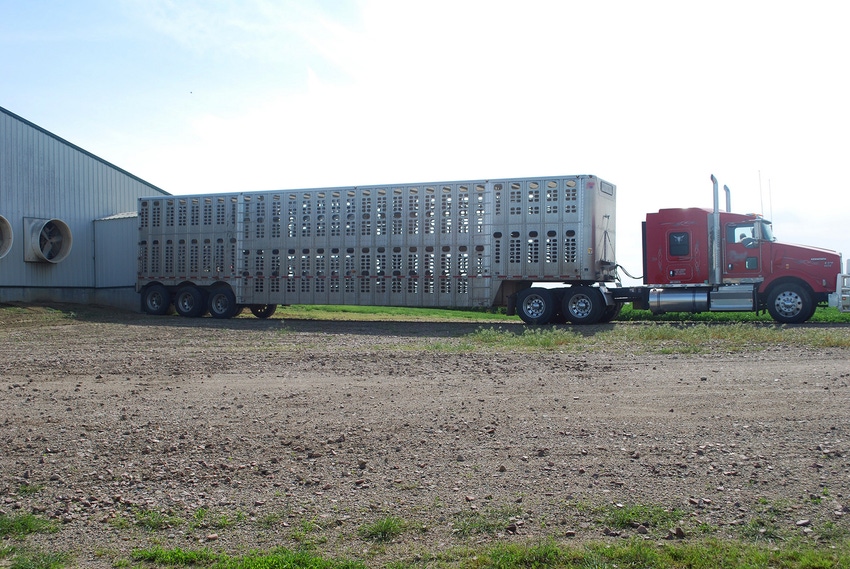Livestock industry applauds withdrawal of GIPSA rules
The interim final rule would have broadened the scope of the Packers and Stockyards Act of 1921 related to using “unfair, unjustly discriminatory or deceptive practices” and to giving “undue or unreasonable preferences or advantages.”
October 17, 2017

The U.S. livestock industry and Congressional ag leaders applaud the Trump administration’s decision to not move forward with an interim final rule of the so-called Farmer Fair Practices Rules, which was written in 2016 by the USDA’s Grain Inspection, Packers and Stockyards Administration. The agency also announced it will take no further action on a proposed regulation of the Farmer Fair Practices Rules.
National Pork Producers Council’s President Ken Maschhoff says, “We’re very pleased that the secretary (Sonny Perdue) will withdraw these bad regulations, which would have had a devastating impact on America’s pork producers. The regulations would have restricted the buying and selling of livestock, led to consolidation of the livestock industry — putting farmers out of business — and increased consumer prices for meat.”
The interim final rule would have broadened the scope of the Packers and Stockyards Act of 1921 related to using “unfair, unjustly discriminatory or deceptive practices” and to giving “undue or unreasonable preferences or advantages.” Specifically, it would have made such actions per se violations of federal law even if they didn’t harm competition or cause competitive injury, prerequisites for winning PSA cases. (The proposed rule would have defined the terms in the interim final rule.)
In 2010, the USDA proposed several PSA provisions — collectively known as the GIPSA Rule — that Congress mandated in the 2008 farm bill. Although lawmakers did not include a provision eliminating the need to prove a competitive injury to win a PSA lawsuit, the agency included one in its proposed regulation.
“After nearly a decade of battling partisan and contentious GIPSA reforms, America’s livestock, poultry and packing industries can breathe a sigh of relief. Today’s decision helps restore both Congressional intent and common sense by ensuring American producers have the freedom to market their products without the threat of frivolous lawsuits,” says K. Michael Conaway (TX-11), House Agriculture Committee chairman. “I appreciate the Trump administration’s dedication to regulatory reform through the rollback of unnecessary and burdensome regulations like these. I am particularly thankful for Secretary Perdue’s leadership on this effort and look forward to working with him to ensure that other problematic regulations like the organic livestock rule meet the same fate.”
The NPPC was the leading voice in opposition to the broader GIPSA rule, generating in 2010 more than 16,000 comments from pork producers against it, and to the interim final rule. It got about 2,000 comments early this year in opposition to that rule.
“Eliminating the need to prove injury to competition would have prompted an explosion in PSA lawsuits by turning every contract dispute into a federal case subject to triple damages,” says Maschhoff, a pork producers from Carlyle, Ill. “The inevitable costs associated with that and the legal uncertainty it would have created likely would have caused further vertical integration of our industry and driven packers to own more of their own hogs.
“That would have reduced competition, stifled innovation and provided no benefits to anyone other than trial lawyers and activist groups that no doubt would have used the rule to attack the livestock industry.”
“Excessive regulations with questionable legal backing ultimately lead to a wave of lawsuits and to years of litigation. The withdraw of the GIPSA rule brings years of regulatory uncertainty in our livestock, poultry and packing industries to an end,” says Livestock and Foreign Agriculture Subcommittee Chairman David Rouzer (NC-07).
Barry Carpenter, president and CEO of the North American Meat Institute, says “We appreciate Secretary Perdue and the agency carefully considering the many comments submitted, including strong opposition from many livestock and poultry producers who recognized the interim final rule would have greatly harmed the entire industry. The secretary and his staff recognized the considerable harm the rule would have done to those farmers and ranchers, as well as consumers, retailers and meat packers and processors.”
The interim final rule was originally published in October 2016, near the end of the Obama administration, and was set to take effect in February 2017, before it was delayed by the new administration. The interim final rule attempted to renew a proposal rejected by Congress through four funding bills and directly circumvented the rulings of eight separate federal appeals courts. The interim final rule would have greatly limited marketing agreements that allow the industry to meet consumer demand for various animal handling and production requirements, such as organic, grass fed, raised without antibiotics and others, limiting the availability of these products for consumers.
“The Meat Institute has long argued the interim final rule was inconsistent with the existing statute, years of judicial precedent and the will of Congress, with a price tag in the billions. The administration’s fresh look shows it’s time to move on from this irresponsible rule,” Carpenter says.
An Informa Economics study found that the 2010 GIPSA Rule today would have cost the U.S. pork industry more than $420 million annually — more than $4 per hog — with most of the costs related to PSA lawsuits brought under the “no competitive injury” provision included in the interim final rule.
You May Also Like



